.gif)
.gif)

During his address at the Shanghai Cooperation Organisation (SCO) Defence Ministers' Meeting in Qingdao, China, Defence Minister Rajnath Singh delivered a strong statement, identifying peace, security, and a pervasive trust deficit as the most significant challenges facing the region. In a clear and firm message aimed at countries that use terrorism as a tool of state policy, Singh urged the SCO to take a principled stand against such double standards.
Without directly naming Pakistan, Singh’s comments highlighted India’s long-standing concerns regarding cross-border terrorism. He emphasized that some nations not only use cross-border terrorism as a policy instrument but also provide safe havens to terrorists. "There should be no place for such double standards. SCO should not hesitate to criticise such nations," the Defence Minister asserted, pushing for a united and unequivocal front against terrorism.
The Minister's remarks were made just weeks after a horrific terrorist attack in Jammu and Kashmir's Pahalgam on April 22, 2025. The attack, which claimed the lives of 26 innocent civilians, including a Nepali national and a local pony handler, was a brutal act of targeted violence. According to Singh, the victims were tragically profiled and killed based on their religious identity.
The terrorist group 'The Resistance Front' (TRF), a proxy for the UN-designated terrorist organization Lashkar-e-Taiba (LeT), claimed responsibility for the "dastardly and heinous attack on innocent tourists." The minister's detailed mention of the incident served to underscore the real-world consequences of state-sponsored terrorism and the urgent need for international action.
The two-day SCO Defence Ministers' meeting, hosted by China from June 25 to 26, brought together defence ministers and senior officials from the organization’s ten full member states: India, China, Russia, Pakistan, Kazakhstan, Kyrgyzstan, Tajikistan, Uzbekistan, Iran, and new entrant Belarus. The meeting's theme, "Upholding the Shanghai Spirit: SCO on the Move," aimed to foster cooperation and dialogue on regional security.
Singh also advocated for "reformed multilateralism," stressing that no single country, regardless of its size or power, can manage global challenges alone. He proposed that enhanced dialogue and collaboration mechanisms are essential to prevent conflicts and build cooperation among nations for mutual benefit, reflecting India's commitment to multilateral solutions to complex problems.